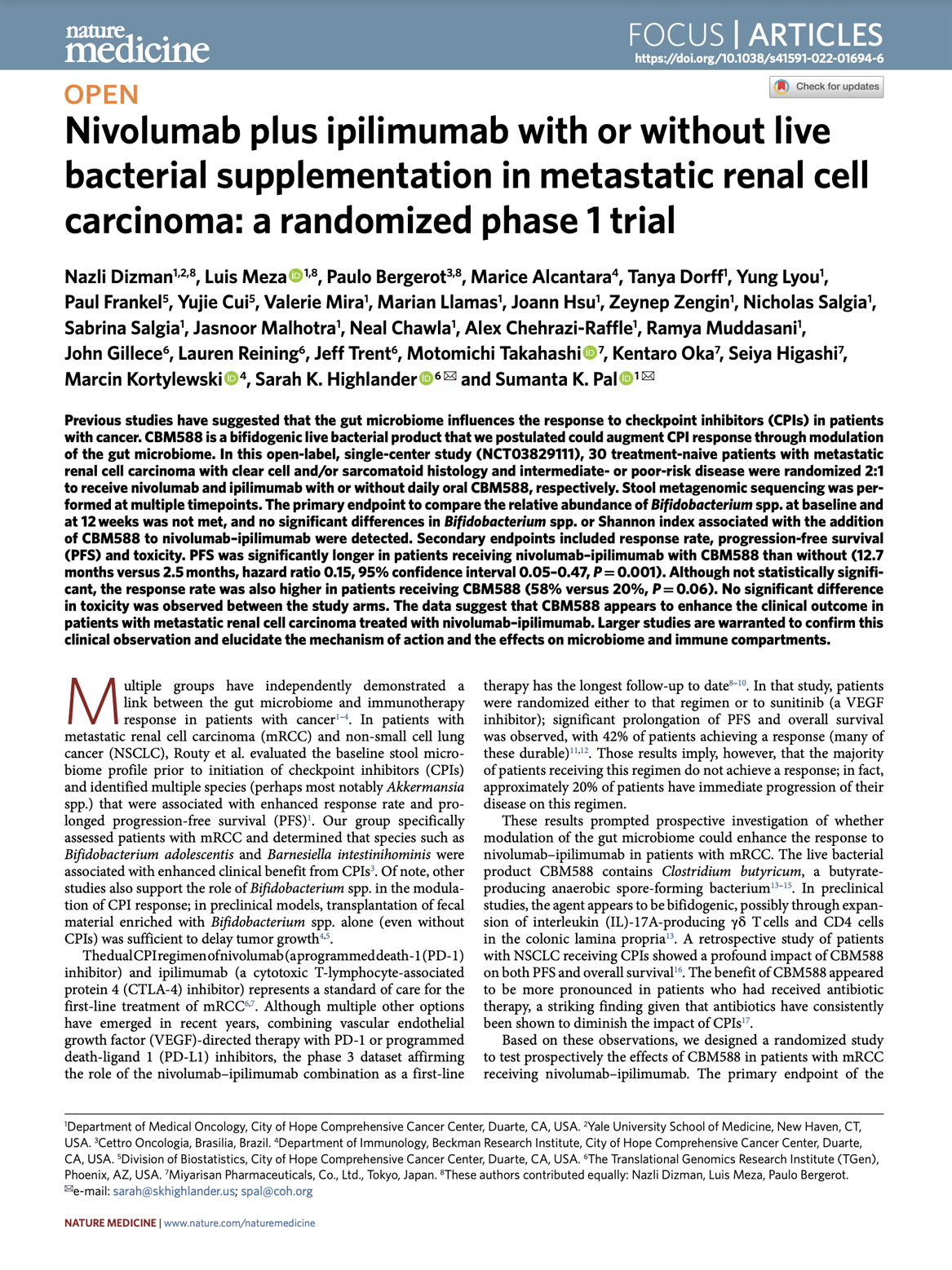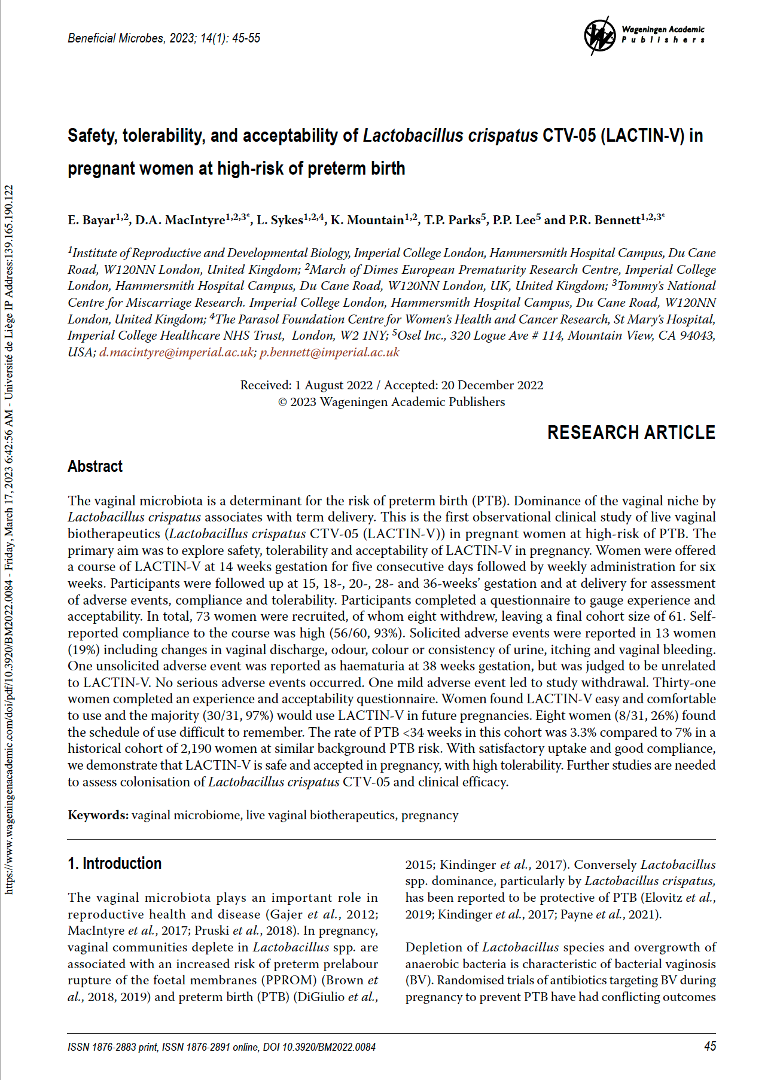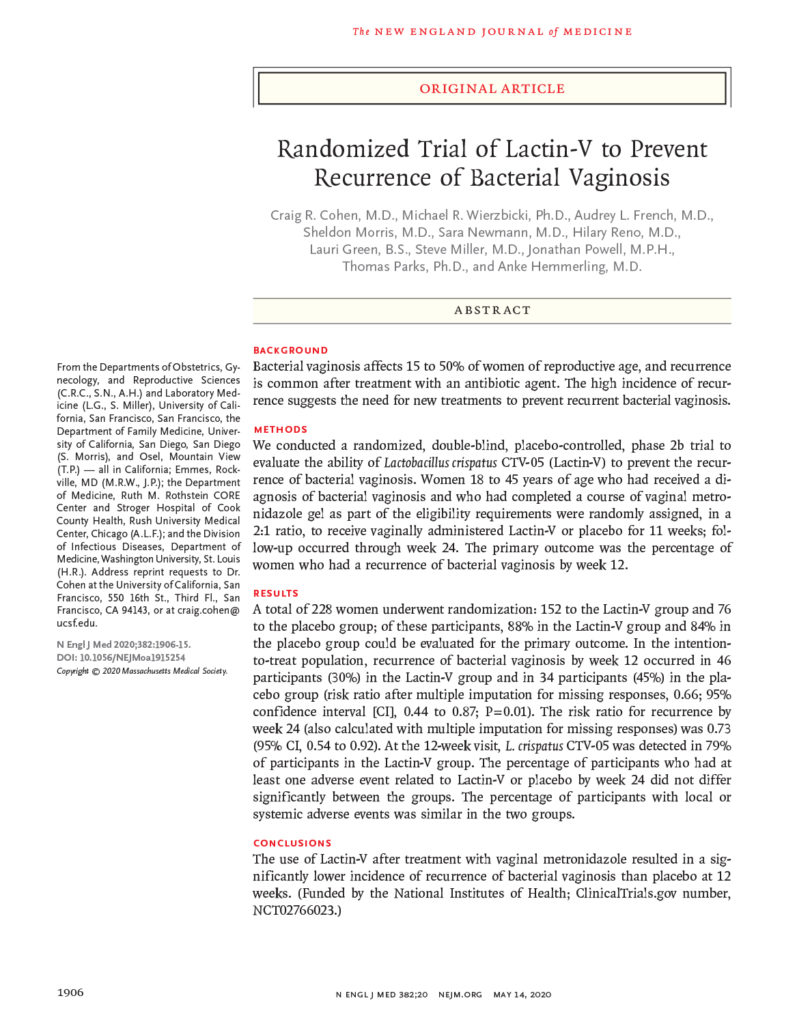Selected Publications
Follow up study of CBM588 in advanced renal cell carcinoma published in Nature Medicine
June 28, 2024
CBM588 significantly improved the outcomes of advanced kidney cancer patients undergoing immunotherapy with cabozantinib and nivolumab in a Phase 1 study conducted at the City of Hope Comprehensive Cancer Center. The study was led by Sumanta Pal, MD and builds on an earlier randomized study to prospectively assess the live biotherapeutic product CBM588 in combination with the immune checkpoint inhibitors nivolumab and ipilimumab.
Vaginal Lactobacillus crispatus persistence following application of a live biotherapeutic product: colonization phenotypes and genital immune impact
June 21, 2024
A nested sub-study in 32 participants receiving LACTIN-V in the Phase 2b BV trial found that 72% demonstrated clinically relevant colonization (CTV-05 absolute abundance >106 CFU/mL) while 28% of women demonstrated colonization resistance. Immediately prior to LACTIN-V administration, the colonization-resistant group exhibited vaginal dysbiosis indicative of metronidazole treatment failure. Colonization resistance was associated with elevated vaginal markers of epithelial disruption and reduced chemokines, possibly due to elevated abundance of BV-associated species and reduced L. crispatus. Colonization permissive women were stratified into sustained and transient colonization groups (31% and 41% of participants, respectively) based on CTV-05 colonization after cessation of product administration. The genital immune profile of LACTIN-V was contingent on the CTV-05 colonization phenotype, which in turn was dependent on the success of BV clearance prior to LACTIN-V administration.
June 1, 2024
In the LACTIN-V Phase 2b trial, 88% of participants achieved a bacterial vaginosis (BV) clinical cure following treatment with vaginal metronidazole gel. The effectiveness of LACTIN-V in reducing BV recurrence was shown to be significantly greater for participants with a post-antibiotic BV clinical cure compared to those without a clinical cure. Vaginal colonization of L. crispatus CTV-05 was also significantly higher in women achieving a post-antibiotic BV clinical cure.
November 13, 2023
Lactobacillus iners (and vaginal dysbiosis) has been associated with HPV progression to cervical dysplasia and cancer, but the reason for this remained unclear. In a study conducted by collaborators at the MD Anderson Cancer Center, a tumor-specific pathotype of L. iners (oncogenic L. iners) was identified that is significantly associated with recurrence of cervical cancer and poor survival of patients following chemoradiation therapy. This discovery provides the scientific rationale for the use of the Gassericin K7B bacteriocin in cervical cancer treatment.
LACTIN-V Phase 1 study in pregnant women at high risk of preterm birth published in Beneficial Microbes
February 23, 2023
A new article in Beneficial Microbes reported the initial results of a LACTIN-V Phase 1 observational trial in 61 pregnant women at high-risk of preterm birth (PTB). LACTIN-V was shown to be safe, tolerable, and acceptable in this cohort with good compliance. In addition, the rate of PTB at <34 weeks and <37 weeks in women treated with LACTIN-V (Lactobacillus crispatus CTV-05) was approximately one-half the rate of a historical cohort of women at similar background risk of PTB. Lactobacillus crispatus dominance of the vaginal microbiome is known to be associated with term delivery. The study was conducted at Prematurity Prevention Service at Imperial College Healthcare NHS Trust in London, U.K. The study was led by lead author Erna Bayar, and David MacIntyre and Phillip Bennett of Imperial College London, and supported by the March of Dimes European Prematurity Research Centre at Imperial, Tommy’s National Centre for Miscarriage Research, and the Imperial NIHR Biomedical Research Centre. This is the first observational clinical study of a live vaginal biotherapeutic (LACTIN-V) in pregnant women at high-risk of PTB.
CBM588 Phase 1 metastatic renal cell carcinoma study published in Nature Medicine
February 28, 2022
A recent article in Nature Medicine showed that CBM588 significantly improved the outcomes of patients with advanced kidney cancer and undergoing immunotherapy in a Phase 1 study conducted at the City of Hope Comprehensive Cancer Center. The study was led by Sumanta Pal, MD and represents the first randomized study to prospectively assess a live biotherapeutic product in combination with immune checkpoint inhibitors.

LACTIN-V Phase 2b Bacterial Vaginosis Study Published in the New England Journal of Medicine
May 14, 2020
A new article in the New England Journal of Medicine (NEJM) showed that LACTIN-V significantly reduced the recurrence of bacterial vaginosis (BV) in a Phase 2b study conducted at four sites in the U.S. The study was led by Craig Cohen, MD, MPH and Anke Hemmerling, MD, PhD, MPH of the University of California, San Francisco and supported by the National Institutes of Health (NIH). LACTIN-V represents the first microbiome-based drug to significantly reduce the recurrence of BV in an FDA-regulated trial.
read more
LACTIN-V
Armstrong et al. Vaginal Lactobacillus crispatus persistence following application of a live biotherapeutic product: colonization phenotypes and genital immune impact. Microbiome. 2024 Jun 21;12(1):110. doi: 10.1186/s40168-024-01828-7.
Hemmerling et al. Response to Antibiotic Treatment of Bacterial Vaginosis Predicts the Effectiveness of LACTIN-V (Lactobacillus crispatus CTV-05) in the Prevention of Recurrent Disease. Sex Transm Dis. 2024, 51(6):437-440.
Bayar E et al., Safety, tolerability, and acceptability of Lactobacillus crispatus CTV-05 (LACTIN-V) in pregnant women at high-risk of preterm birth. Benef Microbes . 2023 Mar 14;14(1):45-55. doi: 10.3920/BM2022.0084
Armstrong E et al., Sustained effect of LACTIN-V (Lactobacillus crispatus CTV-05) on genital immunology following standard bacterial vaginosis treatment: results from a randomised, placebo-controlled trial. Lancet Microbe. 2022 June ; 3(6): e435–e442.
Armstrong E et al., Metronidazole treatment rapidly reduces genital inflammation through effects on bacterial vaginosis-associated bacteria rather than lactobacilli. J Clin Invest. 2022, Feb 3:e152930.
Lagenaur LA et al., Connecting the Dots: Translating the Vaginal Microbiome Into a Drug. J Infect Dis. 2021, 223(12 Suppl 2):S296-S306.
Cohen CR et al., Randomized Trial of LACTIN-V to Prevent Recurrence of Bacterial Vaginosis. N Engl J Med. 2020, 382(20):1906-1915.
Brown RG et al., Establishment of vaginal microbiota composition in early pregnancy and its association with subsequent preterm prelabor rupture of the fetal membranes. Transl Res. 2019 207:30-43.
Kindinger LM et al., The interaction between vaginal microbiota, cervical length, and vaginal progesterone treatment for preterm birth risk. Microbiome. 2017, 5(1):6.
Haahr T et al., Abnormal vaginal microbiota may be associated with poor reproductive outcomes: a prospective study in IVF patients. Hum Reprod. 2016 Apr;31(4):795-803.
Hemmerling A et al., Phase 2a study assessing colonization efficiency, safety, and acceptability of Lactobacillus crispatus CTV-05 in women with bacterial vaginosis. Sex Transm Dis. 2010, 37(12):745-50.
Stapleton AE et al., Randomized, placebo-controlled phase 2 trial of a Lactobacillus crispatus probiotic given intravaginally for prevention of recurrent urinary tract infection. Clin Infect Dis. 2011, 52(10):1212-7.
Ngugi BM et al., Effects of bacterial vaginosis-associated bacteria and sexual intercourse on vaginal colonization with the probiotic Lactobacillus crispatus CTV-05. Sex Transm Dis. 2011, 38(11):1020-7.
Hemmerling A et al., Phase 1 dose-ranging safety trial of Lactobacillus crispatus CTV-05 for the prevention of bacterial vaginosis. Sex Transm Dis. 2009, 36(9):564-9.
Czaja CA et al., Phase I trial of a Lactobacillus crispatus vaginal suppository for prevention of recurrent urinary tract infection in women. Infect Dis Obstet Gynecol. 2007;2007:35387.
Kwok L et al., Adherence of Lactobacillus crispatus to vaginal epithelial cells from women with or without a history of recurrent urinary tract infection. J Urol. 2006 176(5):2050-4; discussion 2054.
Gassericin K7B Bacteriocin, Lactobacillus iners
Colbert LE et al., Tumor-resident Lactobacillus iners confer chemoradiation resistance through lactate-induced metabolic rewiring. Cancer Cell. 2023, 41(11):1945-1962.e11.
Nilsen T et al., Novel Selective Inhibition of Lactobacillus iners by Lactobacillus-Derived Bacteriocins. Appl Environ Microbiol. 2020, 86(20):e01594-20.
CBM588
Ebrahimi H et al., Cabozantinib and nivolumab with or without live bacterial supplementation in metastatic renal cell carcinoma: a randomized phase 1 trial. Nat Med. 2024, https://doi.org/10.1038/s41591-024-03086-4.
Tomita Y et al., Association of Clostridium butyricum Therapy Using the Live Bacterial Product CBM588 with the Survival of Patients with Lung Cancer Receiving Chemoimmunotherapy Combinations. Cancers (Basel). 2023, 16(1):47.
Tomita Y et al., Clostridium butyricum therapy restores the decreased efficacy of immune checkpoint blockade in lung cancer patients receiving proton pump inhibitors. Oncoimmunology. 2022 May 27;11(1):2081010.
Dizman N, Meza L et al., Nivolumab plus ipilimumab with or without live bacterial supplementation in metastatic renal cell carcinoma: a randomized phase 1 trial. Nature Medicine. 2022, Feb 28. doi: 10.1038/s41591-022-01694-6.
Tomita Y et al., Association of Probiotic Clostridium butyricum Therapy with Survival and Response to Immune Checkpoint Blockade in Patients with Lung Cancer. Cancer Immunol Res. 2020, 8:1236–42.
Hayashi A et at., The Butyrate-Producing Bacterium Clostridium butyricum Suppresses Clostridioides difficile Infection via Neutrophil- and Antimicrobial Cytokine-Dependent but GPR43/109a-Independent Mechanisms. J Immunol. 2021, 206(7):1576-1585.
Hagihara M et al., Clostridium butyricum enhances colonization resistance against Clostridioides difficile by metabolic and immune modulation. Sci Rep. 2021, 11(1):15007.
Ariyoshi T et al., Clostridium butyricum MIYAIRI 588 Modifies Bacterial Composition under Antibiotic-Induced Dysbiosis for the Activation of Interactions via Lipid Metabolism between the Gut Microbiome and the Host. Biomedicines. 2021, 9(8):1065.
Hagihara M et al., Clostridium butyricum Modulates the Microbiome to Protect Intestinal Barrier Function in Mice with Antibiotic-Induced Dysbiosis. iScience. 2020, 23(1):100772.
Ariyoshi T et al., Clostridium butyricum MIYAIRI 588-Induced Protectin D1 Has an Anti-inflammatory Effect on Antibiotic-Induced Intestinal Disorder. Front Microbiol. 2020, 11:587725.
Hagihara M et al., The impact of probiotic Clostridium butyricum MIYAIRI 588 on murine gut metabolic alterations. J Infect Chemother. 2019, 25(8):571-577.
Hagihara M et al., The impact of Clostridium butyricum MIYAIRI 588 on the murine gut microbiome and colonic tissue. Anaerobe. 2018, 54:8-18.
Isa K et al., Safety assessment of the Clostridium butyricum MIYAIRI 588 probiotic strain including evaluation of antimicrobial sensitivity and presence of Clostridium toxin genes in vitro and teratogenicity in vivo. Hum Exp Toxicol. 2016, 35(8):818-32.
Kashiwagi I et al., Smad2 and Smad3 Inversely Regulate TGF-beta Autoinduction in Clostridium butyricum-Activated Dendritic Cells. Immunity. 2015, 43(1):65-79.
Kanai T, Mikami Y, Hayashi A. A breakthrough in probiotics: Clostridium butyricum regulates gut homeostasis and anti-inflammatory response in inflammatory bowel disease. J Gastroenterol. 2015 50(9):928-39.
Hayashi A et al., A single strain of Clostridium butyricum induces intestinal IL-10-producing macrophages to suppress acute experimental colitis in mice. Cell Host Microbe. 2013, 13(6):711-22.
Shinnoh M et al., Clostridium butyricum MIYAIRI 588 shows antitumor effects by enhancing the release of TRAIL from neutrophils through MMP-8. Int J Oncol. 2013, 42(3):903-11.


